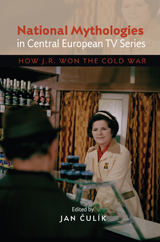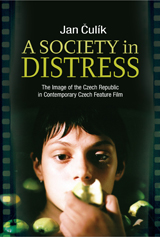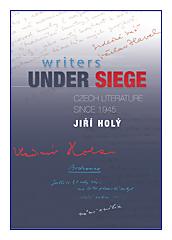Resources in English on Czech film, literature and politics
1. 2. 2009
There is very little detailed information, available on the web in English on various aspects of Czech literature, culture and politics, as well as on the value system of contemporary Czech society. We have thought it useful to bring together on a single web page various articles in English, dealing with various aspects of life in the Czech Republic. Many of these have been written by Jan Čulík, editor of Britské listy, as material for his students at Glasgow University in Scotland.
Na webu je velmi málo podrobnějších informací o české literatuře, kultuře a politice v angličtině. Rozhodli jsme se na jedné internetové stránce dát čtenářům k dispozici soubor článků v angličtině právě na tato témata. Autorem většiny z nich je šéfredaktor Britských listů Jan Čulík; mnohé z nich vznikly jako materiál pro jeho studenty na Glasgow University ve Skotsku.
Islamophobia in the Czech Republic and the Refugee Crisis
Since the beginning of the European refugee crisis in 2015, Britské has been publishing topical information service in English about the developing narrative about the refugee crisis in the Czech Republic and in Central Europe. All these articles are here: https://blisty.cz/topics/480-refugee-crisis-in-europe
Articles in English on general political developments in Central Europe are here: http://www.gla.ac.uk/schools/mlc/staff/janculik/#/publications,articles
1995: Czech Literature Now
- A volume of translations of short texts from Czech literature, as it was selected and edited for publication by Dr. Igor Hájek (1930-1995), Senior Lecturer in Czech Studies at the University of Glasgow HERE
Czech Renaissance Literature
- Jakub Žytek, Old Czech Books of Travel
Four video interviews on Czech history, literature and economy
- A video interview with Martin Pilař, Ostrava University, on 19th century Czech literature HERE, also available for download from Humbox HERE
- A video interview with Martin Myant on Czech economics since the fall of communism is HERE, also in HERE
- A video interview with Jan Čulík on Czech history is HERE, also in Humbox HERE
- A video interview with Jan Čulík on twentieth-century Czech literature is HERE, also in Humbox HERE
In all, there are more than forty different materials on Czech resources in Humbox, the British academic resource, see HERE
Regime Transition in Czechoslovakia
- 1968 Prague Spring - powerpoint presentation
- Czechoslovakia under Communism: popular opinion
- Czechoslovakia 1970 - 1989 with a powerpoint presentation
- Czech Political Culture in the 1990s
- Anti-Communism and Emotional Substitutes: (The sources of political legitimacy in the Czech Republic in the 1990s)
- How power makes or brakes political parties
- Pavel Kohout and Communism in Czechoslovakia
- Rising Discontent: The year 1999 in Review
- Andrew Stroehlein, Steven Saxonberg and Kazi Stastna, The Czech Republic 1992 to 1999: From unintentional political birth to prolonged political crisis
- Andrew Stroehlein, Czech Media, Czech politics and Czech culture - a selection of articles from 1998 - 1999
- Czech Media - a postcommunist model?
- Czechoslovakia/Czech Republic: Cultural Transition since 1989
- Czechoslovakia/Media - the Czech Republic: A General Overview, April 2002)
Material on Czech literature, culture and politics:
- Štefan Švec, The Crisis in Czech Literature: Some Superficial Marketing Twaddle
- Miroslav Holub (1923-1998)
- Josef Škvorecký (1924-)
- Bohumil Hrabal (1914-1997)
- Arnošt Lustig (1926-)
- Václav Havel (1936 - )
- (Additional info:) Václav Havel (JČ 's article for The Scotsman, 1990)
- The Theatre of the Absurd
- (Additional info:) Václav Havel ( JČ's review of James Pontuso's monograph)
Czech Cinema
-
Czech Feature Film Since 1989, a lecture given in Glasgow on 25th April, 2008.
A related powerpoint presentation
- Czech Cinema, A brief general intro.
- The Prague Spring as reflected in Czech postcommunist cinema, with a related powerpoint presentation
Individual Films:
-
Jízda (The Ride), director Jan Svěrák (1994)
-
Silný kafe (Bitter Coffee), director Borkur Gunnarsson (2004)
-
Horem pádem (Helter Skelter), director Jan Hřebejk (2004)
-
Poslední motýl (The Last Butterfly), director Karel Kachyňa (1990)
- Kouř (Smoke), director Tomáš Vorel (1990)
- Nuda v Brně (Bored in Brno), director Vladimír Morávek (2003)
-
Štěstí (Something Like Happiness), director Bohdan Sláma (2005)
-
Babí léto (Indian Summer), director Vladimír Michálek (2001)
-
Návrat idiota (Return of the Idiot), director Saša Gedeon (1999)
-
Knoflíkáři (Buttoners), director Petr Zelenka (1997)
- Šílení (The Lunatics), director Jan Švankmajer (2005)
- Vratné lahve (Empties), director Jan Svěrák (2007)
- O rodičích a dětech (Of parents and children), director Vladimír Michálek (2008)
- Tajnosti (Secrets), director Alice Nellis (2007)
Books

National Mythologies in Central European TV Series
How J.R. won the Cold War
Edited by Jan Čulík
Sussex Academic Press, 2013
This is the first ever international comparative study of the mythologies which popular TV series in Czechoslovakia/Czech Republic, Hungary, Poland and Romania -- made before and after the fall of communism -- disseminate in their societies. Popular television broadcasting has had an enormous impact on the general public's beliefs and values, East and West. From the outset, the communist systems of Central and East Europe used entertainment television programming to instil the regimes' values in the viewer. And indeed popular television still exerts a major impact on these fairly homogeneous societies.
Up to date research about current social values and factors in the formation of individual and collective identity has considerable strategic importance for decision making both in Britain and in the EU. If we are to understand how the populations of the Central and East European countries might react in the current relatively unstable political and economic situation, it is necessary to understand the indigenous political, social and cultural discourse in these countries. Comparison of samples of popular television from the 1970s, 1980s and 2000s provides strategically significant material about how these societies think and rationalize, and what their thinking is rooted in. The study proceeds from the premise that popular television series provide a fertile ground of investigation as mass media reflects and shapes social and cultural values.

Jan Čulík, A Society in Distress
The Image of the Czech Republic in Contemporary Czech Feature Film
Sussex Academic Press, 2013, second edition 2014
Jan Čulík's book analyses the value system constructed by Czech feature films produced since the fall of communism in 1989. It provides an overview of some three hundred Czech feature films made during this period. Over fourteen chapters, the book shows how Czech film makers have dealt with the legacy of communism and other traumatic past experiences, and how they have borne witness to recent political and social developments in the Czech Republic. In Čulík's view, Czech feature film constructs an image of society which is still heavily influenced by the so-called "normalization" regime of the 1970s and 1980s, which was created in Czechoslovakia after the 1968 Soviet invasion. Czech feature films bear witness to a society which suffers from fairly weak social and political structures. Many Czech films highlight the subordinate position of women in Czech society and project an image of impractical, inefficient, and aggressive men. In discussing the films, Čulík uses the methodology of Cultural Studies, in which art is seen primarily as a specific kind of social communication within a certain cultural and historical context.

Jiří Holý, Writers under Siege. Czech Literature since 1945
Sussex Academic Press, 2007, second edition 2010.
This is the first history of Czech Literature, published in English, in
more than 30 years (since the publication of Arne Novak's "Czech
Literature" in 1976). The history, written by Jiri Holy, Professor of
Czech Literature at Charles University, Prague, has been translated by
Elizabeth Morrison and Jan Čulík, who has also edited the volume.
Sussex Academic Press, Brighton, 360 pp.
Book is available from here
Older material
- In a polemic with Jan Čulík, (former) Czech Prime Minister Vaclav Klaus warns against the Internet (31st May, 1997)
- "Is Klaus's package of economic measures going to be effective?" An analysis by Martin Myant of Paisley University, Great Britain (22nd April, 1997)
Czech day at Glasgow University (14th March 1997)
- What is going on in Czech politics (Jan Čulík)
- Is the Czech economic transformation over? (Martin Myant)
Czech Literature
- Czech emigré literature - an attempt at a definition (Jan Čulík, 1995)
- Czech literature and culture: the long shadow of the curse of the Prague Spring (Jan Čulík, BASEES 1999)
- Czech Literature in the 1990s: A lecture, given in English at Glasgow University by Dr. Jiri Holy, Czech Academy of Sciences, Prague
Media Studies/ Sdelovaci prostredky v CR
- Commercial TV in the Czech Republic: the state of play, as it was in 1997: Central European Media Enterprises, Ronald Lauder, Mark Palmer, Vladimir Zelezny, NOVA TV, the Czech Council for Radio and TV broadcasting and the Czech Republic : (For later developments, especially since 1999, see Jan Čulík's regular contributions in Central Europe Review , for full background to the history of TV Nova, see also this article by Jan Čulík from 1997, written for Transitions.)
More older articles
Literature and political culture:
- Czech literature and the reading public
- Intellectuals in the Czech Republic now
- Czech political culture in the 1990s
Obsah vydání | Sobota 10.12. 2016
-
23.2. 2013 / Daniel ŘezníčekA fierce controversy about the meaning of Jan Palach's immolation has flared up in the Czech Republic6.7. 2011 / Ema ČulíkThe New Almodóvar warns against superficial attractiveness and obsession with science2.7. 2011 / Ema ČulíkTerrence Malick's The Tree of Life - the film that was awarded the main prize in Cannes20.1. 2011 / Politics of Language: Approaches to Nations, Communities and Cultures in Contemporary Central Europe9.1. 2011 / Greg EvansThe gun attack against Gabrielle Giffords -- a sea change in American politics?23.11. 2010 / Czech Republic: "Equal education for Roma children should be guaranteed", says Commissioner Hammarberg28.10. 2010 / Residence Papers11.10. 2010 / The World We do not Want to Live in5.10. 2010 / Ilona ŠvihlíkováEuro-demonstration in Prague: resistance and the search for alternatives15.9. 2010 / Some Pilots Want Europe to Speak Czech13.9. 2010 / Muriel BlaiveHas the Czech Republic fully come to terms with the memory of the Second World War?23.8. 2010 / Fabiano GolgoRussian boy beaten up by Czech teenagers over the August 21st Russian invasion anniversary